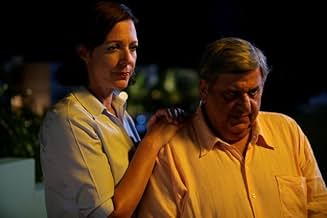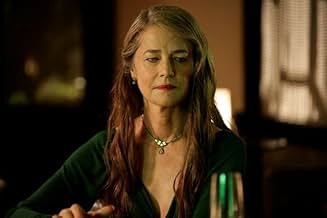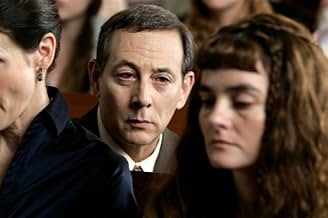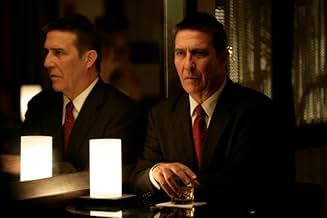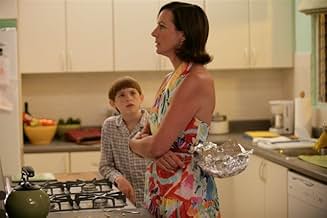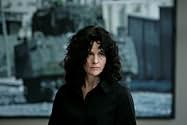Füge eine Handlung in deiner Sprache hinzuFriends, family, and lovers struggle to find love, forgiveness, and meaning in an almost war-torn world riddled with comedy and pathos.Friends, family, and lovers struggle to find love, forgiveness, and meaning in an almost war-torn world riddled with comedy and pathos.Friends, family, and lovers struggle to find love, forgiveness, and meaning in an almost war-torn world riddled with comedy and pathos.
- Auszeichnungen
- 3 Gewinne & 9 Nominierungen insgesamt
- Wanda
- (as Gaby Hoffman)
Empfohlene Bewertungen
I am OK with the decision (probably forced, given the current stature of folks like Philip Seymour Hoffman) to recast everyone involved. But given that this is effectively billed as a spiritual sequel, it's hard to get past some of the resulting serious discrepancies in performance and character. Ally Sheedy, Allison Janney, Claran Hines and Michael K. Williams all turn in otherwise-good performances that unfortunately have very little in common with their characters' original personalities, making believable continuation impossible. Dylan Snyder's Timmy represents a new character that effectively replaces the role of Billy in Happiness, but he's nowhere near as believable or likable as that character was.
Shirley Henderson, in particular, totally misses the tone and purpose of Jane Adams in the role of Joy, who was perhaps the only "sympathetic" character in the original (other than Billy). We no longer experience Joy as a sweet, lovable granola-crunchy dreamer and world-worn lifelong loser. Instead, Henderson comes off as some kind of generally-emotionless whispering wee faerie with none of Adams' warmth or ability to generate pathos. I do, however, greatly enjoy Paul Reubens' spot-on performance in the place of Jon Lovitz's original Andy-- although Andy's role in this movie is now inexplicably central, given how little he really mattered to Joy past the first half-hour in Happiness.
It's hard for a Happiness fan to get past the labored and extremely drawn-out exposition that results from all these character discrepancies. You get the feeling that Solondz is having to take unusual pains to catch us up on the story, and to get us to buy New Actor Y in the role of Old Actor X. The movie starts to finally lift up out of these dregs in the last half hour or so, just in time to make us wonder what the point was, and/or why he didn't just create an entirely new universe with his entirely new cast to save himself (and us) all the trouble. I can't imagine a viewer who has never seen Happiness would find its first two-thirds any more satisfying for all the effort.
Most troublingly for those who can't help but compare (and appropriately so, given the "spiritual sequel" billing), Happiness is a darkly hilarious movie, with most of the humor coming from the unspoken sadness and/or maliciousness of its desperate characters' interactions. Life During Wartime simply isn't funny, and isn't similarly "subtle." It's melodramatic, almost soap-opera-like in tone, with few of the wonderfully dissonant, squirm-in-your-chair moments that made Solondz' '90s works so entertaining (and so fun to show to the uninitiated). It often feels like we're being hit over the head with the "purpose" of each character in Wartime, rather than letting their actions / words simply speak for themselves as it was in Happiness.
This might have been a somewhat OK movie if it had been a fresh start with no baggage from Solondz' masterwork. Obviously, it's hard for any director / producer / screenwriter to escape from their widely-beloved past works if they choose to do something different. But in this case, Solondz actually *chose* to bring that baggage along, and dares fans of the original to make comparisons (as is immediately evident from even the opening scene and credits to anyone who remembers Happiness). I'm not sure if this was a cynical effort on the part of Solondz-- who has had documented troubles getting funding for his 00s movies-- to cash in on the relatively small Happiness fanbase, giving them a movie that they "have to see," even though these two films ultimately have very little in common.
Solondz' more recent work in general has been disappointing to me, but his misguided effort to "continue" Happiness has been by far the biggest and most bitter disappointment yet, failing to add anything new, interesting or even tone-appropriate to the universe he wants us to revisit. I desperately hope he's done making "spiritual sequels" now, and will have something really new to say (hopefully as funny as his old stuff) when his next project rolls around.
Here the story surrounds the life of a kid and the members of his family that are trying to discover the meanings of when and how could people achieve the joy or the happiness in their lives just forgiving or forgetting something harmful enough to be forgotten or forgiven.
As always, Solondz plays with dark humor all the time just to relieve the weight of complex dramatic themes, giving the right balance needed to make real hard life discussions into something as ordinary as a breakfast.
The characters are well constructed and it's interesting the way they lead with the relationships between them. All the time 2 characters are discussing in a table or with something between them, using it like a place where they can put and throw - or sometimes hide - all their problems and differences but at the same time blocking and impeding the reaching of each other, like a battlefield.
Words are like guns and watching those characters hurting each other and using each other words like bullets is shocking because that's what we are, and we are responsible for that. Life During Wartime deals with complex themes, sometimes is a difficult movie for the raw, bitter and impacting dialogs, but you can't run away from them forever.
As another one said: "Todd Solondz is unique and so are his films. He forces you to look through an angle that we systematically ignore".
Great work once again.
Recasting everybody has the weird sense of an alternate universe. It makes this a weirdly unreal movie. I can't say that the actors are inferior but they are different. I'm not a big fan of Happiness and this doesn't change that. I can't find any rooting interest in any of these characters. Some are downright kill worthy. The discussion between Trish and Timmy is so pathetic that it's almost funny. At least, it was memorable.
I'm not sure if this is really supposed to be a sequel to Happiness in the normal sense, but yes, a lot of the characters from that one are back. Sadly Solondz has turned Joy from a half dysfunctional "loser" to a freak, and every scene with her is pretty unbearable. The dad from the first film has also changed a lot, but that makes sense seeing how he's been in prison for years when the film starts.
Palindromes sort of drowned in gloom and repulsion. LDW isn't quite the same but it's still bleak, and often creepy. At times it borders to psychological thriller.
I have to respect Solondz for making a philosophical effort, but if there was a specific point with the story, I didn't quite get it. There's the subject of fear and hysteria in the U.S all over, but other than that, I didn't get that much out of it. All in all it was like a (expectedly) weirdish film with a lot of darkness and absurdity. Happiness and Storytelling were dark but also very funny and balanced with a sort of pleasantness that I just can't see here. It's like a long nightmare.
Before Palindromes Solondz was to me possibly the greatest living director. I REALLY hope he either gets back to his old form or tries out something new that works better.
WUSSTEST DU SCHON:
- WissenswertesA sequel to Todd Solondz's movie Happiness (1998), but with entirely re-cast characters.
- PatzerThe plane has no name or identifying number on its outside, as mandated by ICAO, the international aviation agency.
- Zitate
Trish: So Mark, what do you do?
Mark Wiener: Systems analysis.
Trish: That sounds interesting.
Mark Wiener: It is to me, moderately. Like intermediate level Sudoku; but I have no illusions that what I do is of interest to anyone else. Even among specialists I'm something of functionary, but without ambition, or even hope of ambition. I plateaued in grad school then lost interest except in maintaining a base salary adequate to financing a low overhead subsistence.
- SoundtracksExcerpts from the original motion picture Score to Happiness
Composed by Robbie Kondor
Top-Auswahl
- How long is Life During Wartime?Powered by Alexa
Details
- Erscheinungsdatum
- Herkunftsland
- Offizieller Standort
- Sprache
- Auch bekannt als
- Untitled Todd Solondz Project
- Drehorte
- Produktionsfirma
- Weitere beteiligte Unternehmen bei IMDbPro anzeigen
Box Office
- Budget
- 4.500.000 $ (geschätzt)
- Bruttoertrag in den USA und Kanada
- 281.447 $
- Eröffnungswochenende in den USA und in Kanada
- 30.507 $
- 25. Juli 2010
- Weltweiter Bruttoertrag
- 807.162 $
- Laufzeit1 Stunde 38 Minuten
- Farbe
- Sound-Mix
- Seitenverhältnis
- 1.85 : 1
Zu dieser Seite beitragen





